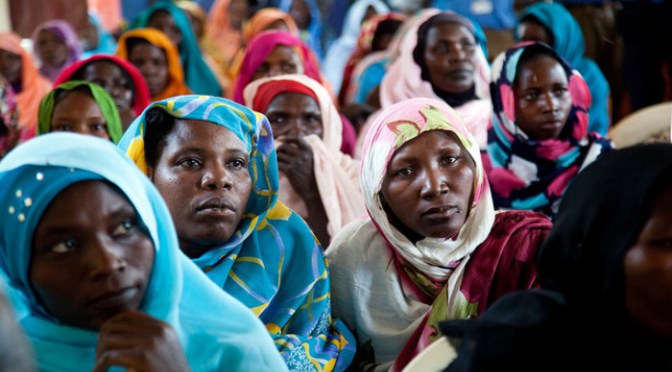Sudan recently changed its rape law after allegations that the law stands in the way of legal protection to rape victims. This has been celebrated as a victory and a signal of political will to protect women and children against sexual violence. But the reform has major weaknesses.
Women’s rights activists have been accused of cooperating with the International Criminal Court (ICC) that has indicted President Omar al-Bashir for the systematic use of rape in the Darfur conflict. Groups that have fought for changes in the rape law have been shut down, censored and harassed.
In the Sharia-based Criminal Code from 1991, rape is defined as sexual intercourse taking place without consent outside of a marriage contract. Sexual intercourse outside a marriage contract is punishable and may be punished with 100 lashes for those who are unmarried, and stoning to death for those who are married. Stoning for adultery has never been enforced in Sudan, but people are regularly whipped for fornication.
Confusion between rape, adultery and fornication has serious consequences for rape victims. To prove infidelity requires confession or four male witnesses. For fornication, pregnancy is sufficient evidence. When the same burden of proof is placed on the rape victims, the perpetrator goes free if he does not confess or four male witnesses endorse the rape victim’s story.
At the same time, the rape victim, if she has reviewed the crime and thus confesses that she has had sexual intercourse, runs the risk of being punished for adultery or fornication if she cannot prove she tried to resist. Even if she does not report rape and is so unlucky that she becomes pregnant, unmarried women risk 100 lashes. In an interview with the author, a Sudanese woman activist describes the problem in the law, “if you cannot prove rape, you are a perpetrator.”
Sudanese women activists have worked hard for a reform of the law. It was put on the agenda in connection with the armed conflict in Darfur where the ICC has put forward evidence that women have been systematically subjected to sexual abuse.
In February 2015, the female activists were heard. The Sudanese parliament approved a reform of the Criminal Code that clearly separates rape and adultery. It came as a surprise to many observers, because on many occasions President Omar al-Bashir has denied that sexual violence is a problem in Sudan.
But even if the reform on the surface is a success story, it has a dark side. While rape reform was adopted, the women’s group Salmmah Women’s Resource Center was closed. This was the group that had spearheaded the so-called 149-campaign. 149 refers to the article of the Criminal Code where rape is defined. Salmmah’s leader is now in exile.
The campaign was launched in 2009. The leader said in an interview with the author that legal safeguards for rape victims in the Darfur conflict was the background for the campaign. She said: “Sexual violence has never before been on the women activist’s agenda. Darfur changed this.” UN Resolution 1325 opened up a political space to talk about the use of sexual violence in the Darfur war, she claimed.
That same year, Sudan’s sitting president was indicted by the International Court for war crimes and crimes against humanity. The regime responded by later expelling several humanitarian organizations from Darfur. Several Sudanese organizations were closed and accused of spying on behalf of the ICC.
Work on sexual violence was particularly politicized, and organizations that worked in this area were particularly vulnerable.
A woman activist the author met in Darfur said: “The arrest warrant against Bashir has affected our work in Darfur. The word protection of civilians has become very sensitive. If we used that word, we are accused by the regime of working to document and report rapes to the International Criminal Court.”
Another said: “My organization was accused of spying on behalf of the International Criminal Court.”
On paper, the rape reform is a step in the right direction. The problem is that the reform is not genuine. Or rather, it is lip service to the ICC. By introducing legal reform attempts, Omar al-Bashir can show that Sudan takes sexual violence seriously. But in reality, he is not. There is no political will, according to activists.
Following the reform, the regime targeted and suppressed groups working with violence against women. After Salmmah was closed, other organizations and women’s groups have closed and their work has been censored by the authorities and activists have been harassed. A woman activist from Darfur says: “(…) There is an absence of organizations dealing with violence against women in Darfur now.”
Even international organizations shun working with sexual violence. A representative of the UN Population Fund (UNFPA) says that “the international organizations that remain in Darfur do not work with sexual violence, because it is too sensitive. They are afraid that the regime will expel them.”
Despite the fact that the reform has obvious shortcomings, the campaign has subsided. The reform may well be a step in the right direction, but the battle is far from won. In the law governing evidence, rape and adultery are still mixed together. Therefore, women’s rights activists believe that the rape reform will not result in better legal protection for rape victims. In addition, rape within marriage is not yet criminalized. Meanwhile, rape victims suffer the consequences.
A version of this text originally appeared, in Norwegian, in a piece titled Reform av voldtektsloven i Sudan – et spill for galleriet in Bistandaktuelt. Translation to English by Amanda Cellini. The text is based on research conducted as part of the project Protection of Civilians: From Principle to Practice and the recently published article “Enemies of the State: Curbing Women Activists Advocating Rape Reform in Sudan”, available here.
